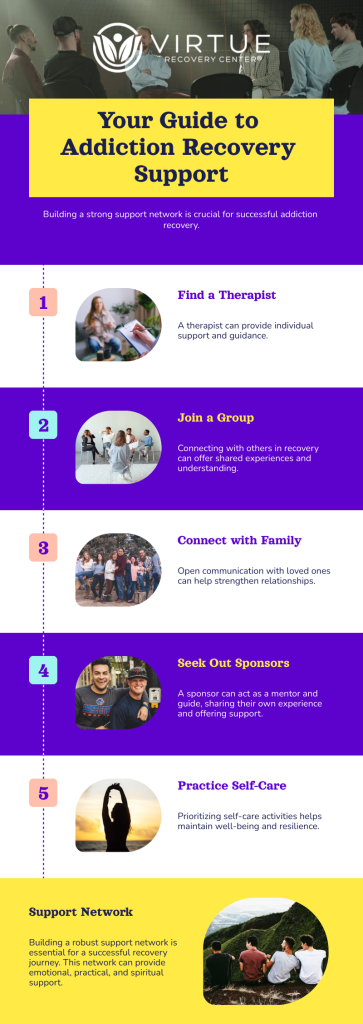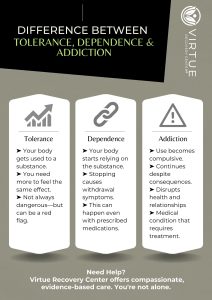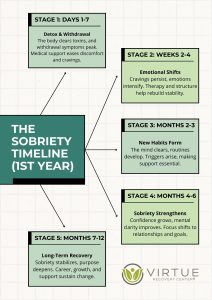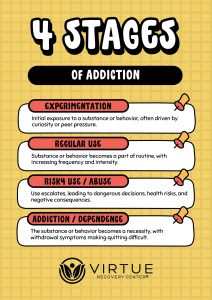Key Takeaways
- A strong support network is crucial for maintaining long-term sobriety.
- Social support helps reduce isolation and provides emotional and practical assistance.
- Building a network of peers, loved ones, and professionals improves recovery outcomes.
Introduction
Recovering from addiction is a challenging journey, but it’s also a rewarding one. While the process of overcoming substance use disorders requires personal effort and dedication, it’s nearly impossible to succeed alone. That’s where a support network comes in. A strong support network can provide encouragement, understanding, and accountability, making the journey more manageable. In addition to emotional support, it can also help individuals recognize the benefits of gratitude in recovery, as focusing on positive aspects of life can foster resilience and motivate continued progress. Engaging with others who share similar experiences often reinforces the importance of celebrating small victories along the way.
A support network comprises people and resources that help you stay on track. Whether it’s family, friends, support groups, or professional counselors, this network plays a key role in your recovery journey. This article will explore how a strong support system aids recovery, provide tips for building one, and highlight why it’s essential for long-term success.
What is a Support Network in Addiction Treatment and Recovery?
A support network consists of people and resources that provide emotional, social, and practical assistance to individuals recovering from addiction.
Key Components of a Personal Support Network:
- Family and Friends: Trusted loved ones who offer encouragement and understanding.
- Peer Support Groups: Communities like Alcoholics Anonymous (AA) and SMART Recovery bring individuals together to share experiences and foster accountability.
- Professional Counselors and Therapists: Experts who provide guidance, coping strategies, and emotional support during recovery.
Building a support network isn’t just about finding people to help you. It’s about creating a community that empowers and motivates you to maintain sobriety.
The Role of a Support System in Recovery
Having a support network during recovery is more than having people to lean on. It plays an active role in helping individuals stay sober, manage stress, and avoid relapse.
How Social Support Systems Can Help in Recovery:
- Reduces Isolation: Addiction often isolates individuals, leaving them feeling lonely. A strong support network provides a sense of connection and belonging.
- Encourages Accountability: Regular communication with supportive people can motivate you to stick to your recovery goals.
- Offers Guidance: Experienced mentors, like sponsors in AA, provide valuable advice based on their recovery journeys.
A support network isn’t just helpful during the early stages of recovery. It’s a vital resource throughout your entire journey to sobriety.
Benefits of Building a Sober Support Network
Emotional Support
Recovery is an emotional process filled with ups and downs. Sharing your feelings with others who understand your struggles can make a big difference.
- Loved ones offer comfort during tough times.
- Support groups provide a safe space to share without fear of judgment.
Practical Assistance
Recovery often involves navigating challenges like attending meetings, managing daily responsibilities, and accessing resources.
- A support network can help you find local recovery programs, attend appointments, or even provide necessary transportation.
Long-Term Sobriety
Research shows that individuals with strong support systems are more likely to maintain long-term sobriety. Stay connected reduces the risk of relapse and builds a healthier, more stable life.
Tips for Building a Strong Support Network During Addiction Treatment
Attend Support Groups
Support groups like AA or NA are excellent places to meet people who understand your experiences. These groups focus on shared experiences, accountability, and encouragement.
Open Up to Loved Ones
Talk to family and friends who are willing to support you. Let them know about your recovery goals and how they can help.
Seek Professional Guidance
Working with a therapist or counselor can help you develop coping strategies and navigate recovery challenges. Professionals can also connect you with additional resources.
Use Online Communities
If you’re not ready to attend in-person meetings, online forums, and virtual support groups can be a great way to start building connections.
Set Healthy Boundaries
Ensure your support network is joyous and free from influences that could harm your recovery. Surround yourself with people who respect your sobriety and want to see you succeed.
Your Guide to Addiction Recovery Support
The infographic “Your Guide to Addiction Recovery Support” offers a clear and visual way to understand how to build a strong support network. Here’s a quick summary of its key points:
- Find a Therapist: Therapists offer personalized guidance and emotional support during recovery.
- Join a Group: Peer support groups provide shared experiences and help build connections.
- Connect with Family: Open communication with loved ones strengthens relationships and creates a safe environment for recovery.
- Seek Out Sponsors: Sponsors offer mentorship, sharing their experiences to guide you through the recovery process.
- Practice Self-Care: Prioritize activities that nurture your physical and emotional well-being.
Using these steps as a guide, you can build a support network that enhances your recovery journey and boosts your confidence.

Conclusion
A support network is one of the most essential tools in addiction recovery. It provides the emotional, social, and practical resources needed to maintain sobriety and improve overall well-being. Connecting with peers, loved ones, and professionals can create a foundation for lasting recovery.
Remember, recovery isn’t a solo journey—it’s a team effort. If you or someone you love is struggling with addiction, professional help is just a phone call away. Contact Virtue Recovery Las Vegas at 866-520-2861 to explore personalized treatment options and take the first step toward a healthier, sober life.
FAQs About The Importance of Social Support in Recovery Treatment
What is the importance of a sober support network in addiction recovery?
A support network provides emotional, social, and practical assistance, helping individuals manage stress, stay accountable, and avoid relapse.
How do I build a support network?
Attend support groups, open up to trusted loved ones, seek professional guidance, and set healthy boundaries to create a positive and encouraging environment.
What are the benefits of peer support groups in recovery?
Peer support groups offer shared experiences, encouragement, and accountability, helping individuals feel less isolated and more motivated to stay sober.
Can I recover without a support network?
While recovery is possible without a formal support network, having one dramatically improves your chances of long-term success and emotional well-being.
What are some types of addiction a support network can help with?
A support network can help with various types of addiction, including substance use disorders (alcohol, opioids, stimulants), behavioral addictions (gambling, gaming), and co-occurring mental health conditions.
What are the different types of support I can receive from addiction support groups?
Addiction support groups can offer emotional support, shared experiences, accountability, practical advice, and encouragement during recovery. They also provide a safe space to connect with others facing similar challenges.
Where can I find addiction support services?
Addiction support services can be found through local treatment centers, community health organizations, online directories, or programs like Alcoholics Anonymous, Narcotics Anonymous, and SMART Recovery. Many resources are also available online or through healthcare providers.













